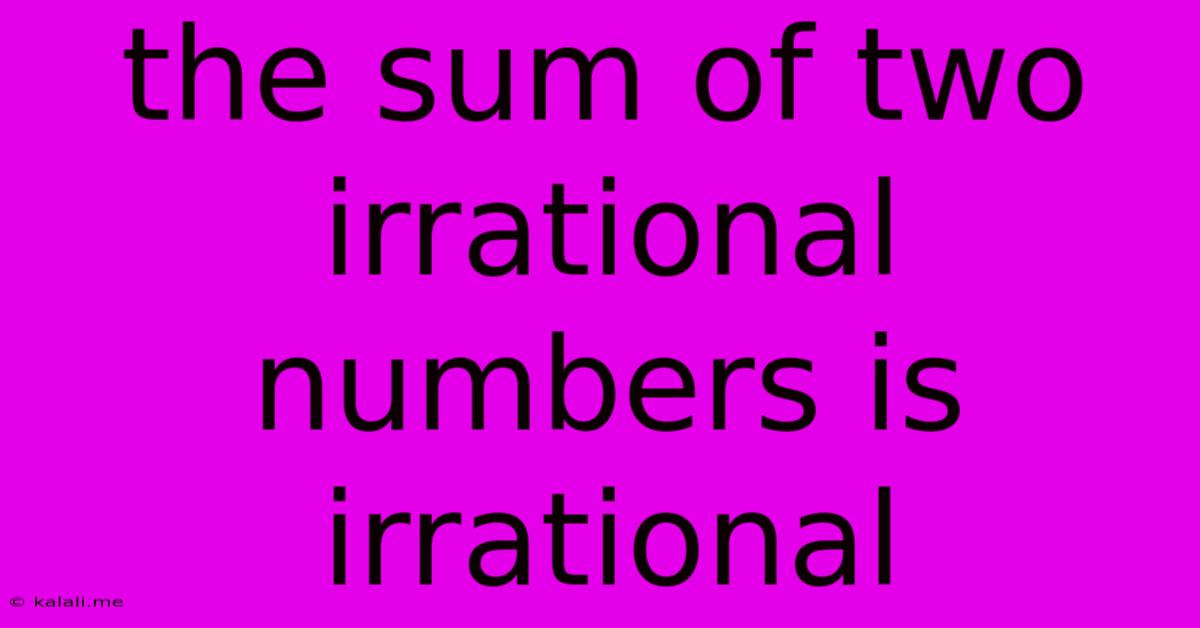The Sum Of Two Irrational Numbers Is Irrational
Kalali
Jun 14, 2025 · 2 min read

Table of Contents
The Sum of Two Irrational Numbers: Is It Always Irrational?
Meta Description: Explore the fascinating world of irrational numbers and delve into the question: is the sum of two irrational numbers always irrational? We'll examine this mathematical concept with examples and counter-examples to reach a definitive answer.
The world of numbers is full of surprises. We often encounter rational numbers, easily expressed as fractions (like 1/2 or 3/4), and irrational numbers, which cannot be expressed as simple fractions (like π or √2). A common question that arises is: what happens when you add two irrational numbers together? Is the result always irrational? The short answer is no, and understanding why is key to grasping deeper mathematical concepts.
Understanding Irrational Numbers
Before diving into the sum, let's solidify our understanding of irrational numbers. These numbers have non-terminating, non-repeating decimal expansions. Famous examples include:
- π (Pi): Approximately 3.14159..., representing the ratio of a circle's circumference to its diameter.
- e (Euler's number): Approximately 2.71828..., the base of the natural logarithm.
- √2 (Square root of 2): Approximately 1.41421..., a number whose square is 2.
These numbers, and countless others, cannot be perfectly expressed as a fraction of two integers. This fundamental characteristic is what sets them apart from rational numbers.
Exploring the Sum of Two Irrational Numbers
Intuitively, one might assume that adding two irrational numbers would always result in another irrational number. However, this is not the case. A simple counter-example is sufficient to disprove this assumption.
Consider the irrational number √2. Now consider its negative counterpart, -√2. Both are irrational. However, their sum is:
√2 + (-√2) = 0
And 0 is a rational number (it can be expressed as 0/1). This clearly demonstrates that the sum of two irrational numbers can, in fact, be rational.
When the Sum Is Irrational
While the sum of two irrational numbers isn't always irrational, there are instances where it is. For example, consider the sum of π and √2. The resulting number is irrational because there's no known way to express π + √2 as a fraction a/b, where a and b are integers. Proving this definitively often requires advanced mathematical techniques. However, it's intuitively clear that the combination of these non-repeating, non-terminating decimal expansions will not magically produce a rational number.
The Key Takeaway
The crucial point is that the sum of two irrational numbers is not guaranteed to be irrational. The specific values of the irrational numbers determine the nature of their sum. It can be rational, as we showed with √2 + (-√2) = 0, or it can remain irrational, as is likely the case with π + √2. This highlights the rich complexity and subtle nuances within the realm of number theory. Understanding this distinction helps in navigating more complex mathematical problems and reinforces the need to carefully consider individual cases rather than relying on generalized assumptions.
Latest Posts
Latest Posts
-
How Does Representative Democracy Differ From Direct Democracy
Jun 14, 2025
-
Is Dembele Right Or Left Footed
Jun 14, 2025
-
The Ends Of A Long Bone Are Known As The
Jun 14, 2025
-
Most Abundant Metal In The Earth Crust
Jun 14, 2025
-
The Area Under A Velocity Time Graph Represents
Jun 14, 2025
Related Post
Thank you for visiting our website which covers about The Sum Of Two Irrational Numbers Is Irrational . We hope the information provided has been useful to you. Feel free to contact us if you have any questions or need further assistance. See you next time and don't miss to bookmark.